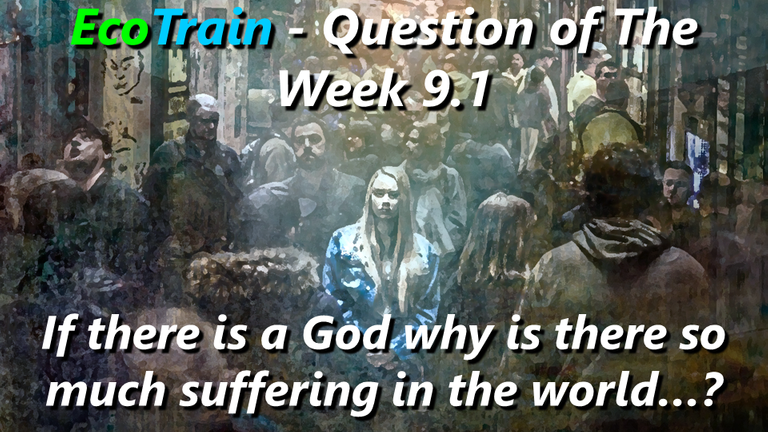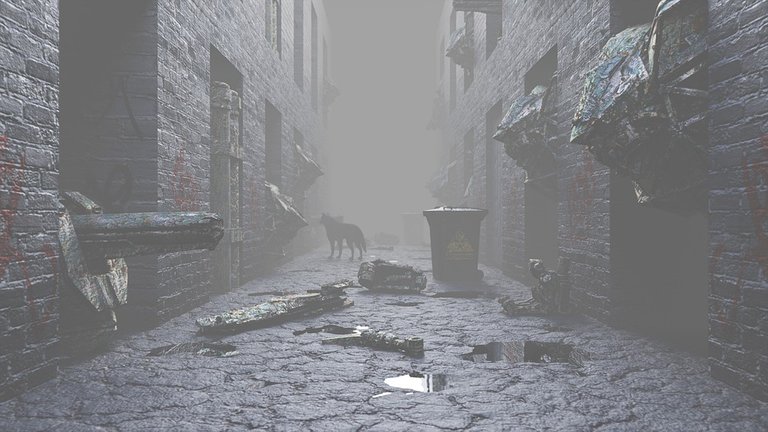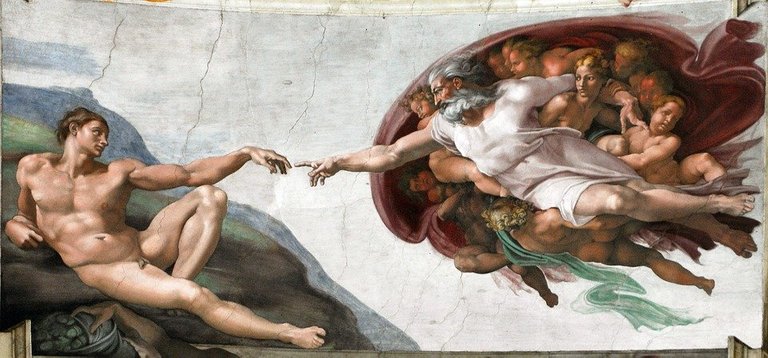If there is a God why is there so much suffering in the world? #EcoTrain #QOTW [ENG-ESP]
This is a question that surely most people in the world have heard or have asked themselves. I believe that the first thing we should consider is, what is each person's concept of God? Perhaps the answer depends on that.
It is also a question that leads us to enter into deep and complex issues such as good and evil, free will, the role of God and its characteristics, etc. I think everyone has their own answers, and it is interesting to read other participations.

If there is something that I have noticed reading other participations is that in many of them the devil or satan is not mentioned. If there is a source for suffering, then the most obvious answer might be evil. But I have found that many opt for a more existential or perhaps more free will based answer, arguably a more "modern" and less religious view.
Suffering can be seen as a consequence of something, that is, a response to something that happens. And it can be due, as has been mentioned in other posts, to natural disasters, or to negative aspects of human beings and our decisions.

I believe that whatever the cause of suffering is, everything has its origin in the chaos that exists in the universe. There are things that happen that we cannot control and we have to be proactive with that, we choose how we react to it, and sometimes that can inevitably bring us suffering.
But when it comes to the human being specifically, suffering can be due to the tendency in a society (or in the world) to feed actions or behaviors that generate harm to others. It has a lot to do with the choices we make. And this is where the issue of good and evil, or free will, comes in.
I believe that, if we were all made to do only good things, without causing suffering, then we would be mechanized beings to always do good, there would be no life or consciousness, we would be like machines. The philosopher Leibniz mentioned something about this. So, there enters our capacity to decide how to react or the actions we take.

Beyond whether or not free will exists, I think there is another aspect to our decisions that I believe influences more suffering in the world. It is egoism. And before making a decision, there must be an origin, an initial thought or desire that led you to make that decision, based on our paradigms or principles, our "moral rules" so to speak.
In the animal world there is suffering, animals that feed on others. And it is difficult to know how conscious animals are that they make others suffer. But I think in the case of human beings we are somehow able to "intellectualize" occurring phenomena and try to avoid future suffering, that's why science exists. We are able to predict some natural phenomena, such as Tsunamis.
But there are still things we cannot predict, such as earthquakes. And I believe that the more WISDOM we have about how the world works, the more suffering we could avoid.

That is why I believe that one of the causes of suffering in the world is lack of wisdom, or perhaps lack of education and/or culture. And although I have mentioned science, for me there is no conflict with religion or spirituality. From my perspective, God transcends both religion and science, and both, instead of contradicting each other, simply seek to explain the same thing from different perspectives.
If we look at it, much of the suffering we see in the world is perfectly avoidable. People who starve to death could have survived if they had had food, and to have had food something had to be changed, not only in their minds and in the culture of society, but in how things work in their environment, so that they could work or access food as people normally do. It is complex, but all this, in my opinion, happens because of a number of factors, among them, the lack of wisdom in the world.
It could be said that wisdom comes from God, it is perfect ideas in a pure state that try to manifest in our physical world. But perhaps our selfishness or immaturity prevents them from doing so.
I believe that suffering, as hard as it sounds, is a way to learn, to make us correct the things we are doing wrong. If you don't do things wisely, you are directly confronted with the laws of the universe. And if you walk "blindly" you are going to hit a wall sooner or later. And there are those who try to turn on the light in the room, and there are those who qualify the wall as "evil".
The "wall" is neither good nor evil, in fact, sometimes I think that Good and Evil do not exist except in the mind of the human being. Everything is based on our decision to adhere or not to wisdom, to God, to the "universe and its laws", or whatever you want to call it. That is why in the famous painting the hand of God and the hand of the human being are separated by a small space, the decision is in us.

At the beginning I talked about the concept of God for everyone, and although God is something that no human being can define, perhaps there are many points of view. In this publication I do not mention that you join a religion, but perhaps for some people religion is their way to get closer to God, that depends on each person.
Some time ago I saw a very good movie that talked precisely about suffering, God, and religion. It is The Shack (2017), I recommend this movie. To cut a long story short, what this movie teaches us about suffering is that when we judge things from the Good/Bad point of view, we only avoid gaining wisdom, and we move away from love, empathy etc. Judging Good/Bad is "eating the apple from the tree", and that is supposedly what God did not want us to do.
Suffering can be avoided? In many cases it could have been avoided in the world, but one has to ask would we have learned anything without suffering? I believe that God gives us two ways to learn, one can be through wisdom, and the other, unfortunately, is suffering, our own or that of others.

And I believe that the "Evil" would come from selfishness, from encouraging ideas or actions that propagate suffering. The bad thing is not the suffering, because at least that tells us that "something is wrong", it is simply the physical laws in action, but the bad thing is to do nothing because there is less suffering, or to make there is more. Suffering is a consequence in this universe created by God, so yes, God is responsible for its existence, but we as humanity are responsible for how we react to it.
| This is the EcoTrain - QUESTION OF THE WEEK 9.2 - "If there is a God why is there so much suffering in the world?". I invite you to participate by sharing your post and of course interacting in the community. |
Versión en Español
Esta es una pregunta que seguramente la mayoría de las personas en el mundo habrán escuchado o se habrán preguntado a sí mismos. Creo que lo primero que debemos tomar en cuenta es ¿Cuál es el concepto de Dios que tiene cada persona? De eso quizás dependa la respuesta de cada quien.
Es también una pregunta que nos lleva a entrar en temas profundos y complejos como lo son el bien y el mal, el libre albedrío, el rol de Dios y sus características, etc. Creo que cada quien tiene sus propias respuestas, y es interesante leer otras participaciones.

Si hay algo que me he dado cuenta leyendo otras participaciones es que en muchas de ellas no se nombra al diablo o a satanás. Si hay una fuente para el sufrimiento, pues la respuesta más obvia podría ser el mal. Pero he encontrado que muchos optan por una respuesta más existencial o quizás más basada en el libre albedrío, podría decirse que una visión más "moderna" y menos religiosa.
El sufrimiento puede verse como una consecuencia de algo, es decir, una respuesta a algo que sucede. Y puede deberse, como ya lo han nombrado en otras participaciones, a desastres naturales, o a aspectos negativos del ser humano y nuestras decisiones.

Creo que sea cual sea la causa del sufrimiento, todo tiene su origen en el caos que hay en el universo. Hay cosas que ocurren que no podemos controlar y debemos ser proactivos con eso, nosotros escogemos cómo reaccionar ante ello, y algunas veces eso puede inevitablemente traernos sufrimiento.
Pero cuando se trata del ser humano específicamente, el sufrimiento puede deberse a la tendencia que hay en una sociedad (o en el mundo) de alimentar acciones o comportamientos que generan daño a los demás. Tiene mucho que ver con las decisiones que tomamos. Y aquí es donde entra el tema del bien y el mal, o el libre albedrío.
Creo que, si todos estuviéramos hechos para hacer solamente cosas buenas, sin causar sufrimiento, entonces seríamos seres mecanizados para hacer siempre el bien, no habría vida o consciencia, seríamos como máquinas. El filósofo Leibniz mencionó algo sobre esto. Entonces, allí entra nuestra capacidad de decidir cómo reaccionar o las acciones que tomamos.

Más allá de si existe o no el libre albedrío, creo que hay otro aspecto en nuestras decisiones que creo que influye a que exista más sufrimiento en el mundo. El egoísmo. Y antes de tomar una decisión, debe haber un origen, un pensamiento o deseo inicial que te llevó a tomar esa decisión, basado en nuestros paradigmas o principios, nuestras "reglas morales" por así decirlo.
En el mundo animal existe el sufrimiento, animales que se alimentan de otros. Y es difícil saber que tan conscientes son los animales de que hacen sufrir a otros. Pero creo que en el caso del ser humano somos capaces de alguna forma de "intelectualizar" los fenómenos que ocurren y tratar de evitar el sufrimiento futuro, por ello existe la ciencia. Somos capaces de predecir algunos fenómenos naturales, como los Tsunamis.
Pero aún hay cosas que no podemos predecir, como por ejemplo, los terremotos. Y creo que en la medida que más Sabiduría tenemos acerca de cómo funciona el mundo, más sufrimiento podríamos evitar.

Es por ello que considero que una de las causas del sufrimiento en el mundo es la falta de sabiduría, o quizás de educación y/o cultura. Y a pesar de que he mencionado a la ciencia, para mi no existe conflicto alguno con la religión o la espiritualidad. Desde mi perspectiva, Dios trasciende tanto religión como ciencia, y ambas cosas en vez de contradecirse simplemente buscan explicar lo mismo desde diferentes perspectivas.
Si nos ponemos a ver, mucho del sufrimiento que vemos en el mundo es perfectamente evitable. Personas que mueren de hambre pudieran haber sobrevivido si hubieran tenido comida, y para haber tenido comida algo debía cambiarse, no solo en su mente y en la cultura de la sociedad, sino en cómo funcionan las cosas en su entorno, para que ellas pudieran trabajar o acceder a la comida tal como las personas normalmente hacen. Es complejo, pero todo esto, en mi opinión, ocurre por gran número de factores, entre ellos, la falta de sabiduría en el mundo.
La sabiduría podría decirse que proviene de Dios, son ideas perfectas en estado puro que tratan de manifestarse en nuestro mundo físico. Pero quizás nuestro egoísmo o inmadurez evitan que lo hagan.
Creo que el sufrimiento, aunque suene duro, es una forma de aprender, hacernos corregir las cosas que estamos haciendo mal. Si no haces las cosas con sabiduría, te enfrentas directamente con las leyes del universo. Y si caminas a "ciegas" pues te vas a estrellar con una pared tarde o temprano. Y están los que intentan prender la luz de la habitación, y están los que califican a la pared como "mala".
La "pared" no es buena ni mala, es más, a veces pienso que el Bien y el Mal no existen sino en la mente del ser humano. Todo se basa en nuestra decisión de apegarnos o no a la sabiduría, a Dios, al "universo y sus leyes", o como lo quieras llamar. Es por ello que en la famosa pintura la mano de Dios y la del humano están separadas por un pequeño espacio, la decisión está en nosotros.

Al principio hablé del concepto de Dios para cada quien, y aunque Dios es algo que ningún ser humano puede definir, quizás hayan muchos puntos de vista. En esta publicación no hago mención de que te unas a una religión, pero quizás para algunas personas la religión si sea su camino para acercarse a Dios, eso depende de cada quien.
Hace un tiempo vi una película muy buena que hablaba precisamente del sufrimiento, Dios, y la religión. Se trata de La Cabaña (The Shack - 2017), recomiendo esta película. Para no extenderme, lo que esta película nos enseña respecto al sufrimiento es que cuando juzgamos las cosas desde el punto de vista Bueno/Malo, solamente evitamos obtener sabiduría, y nos alejamos del amor, empatía etc. Juzgar Bueno/Malo es "comerse la manzana del árbol", y se supone que eso era lo que Dios no quería que hiciéramos.
El sufrimiento ¿Puede evitarse? en muchos casos pudiera haberse evitado en el mundo, pero habría que preguntarse ¿Habríamos aprendido algo sin el sufrimiento? Creo que Dios nos da dos caminos para aprender, uno puede ser a través de la sabiduría, y el otro, lamentablemente es el sufrimiento, propio o de otros.

Y creo que el "Mal" vendría del egoísmo, de fomentar las ideas o acciones que propagan el sufrimiento. Lo malo no es el sufrimiento, porque al menos eso nos indica que "algo va mal", son simplemente las leyes físicas en acción, sino que lo malo es no hacer nada porque haya menos sufrimiento, o hacer que haya más. El sufrimiento es una consecuencia en este universo creado por Dios, por lo que sí, Dios es responsable de que exista, pero nosotros como humanidad somos responsables de cómo reaccionamos ante él.
| Esta es la pregunta de la semana de EcoTrain 9.2 - Si hay un Dios, ¿por qué hay tanto sufrimiento en el mundo?. Te invito a participar compartiendo tu publicación y por supuesto interactuando en la comunidad. |
Translated to English language with the help of DeepL.com
| ¡Gracias por visitar! — ¡Thanks for visiting!  |
beautiful post,thank you for sharing this!
Thanks for visiting my post #ecotrain friends. best regards!
Buen escrito @acont gracias por compartir. Me quiero quedar con: "Creo que cualquiera que sea la causa del sufrimiento, todo tiene su origen en el caos que existe en el universo" coqueteo con eso porque somos parte del universo.
El bien y el mal, también creo que no existe, creo que es propio de la interpretación que le damos.
Excelente tu entrega compleja la propuesta aunque tú hablas de trascendencia de la religión y eso también es interesante.
Saludos. Seguiremos encontrándonos
Hola @rosahidalgo gracias por pasar por acá!
La trascendencia de la religión es algo que creo que cada vez es más frecuente hoy en día, muchas personas asocian ambas cosas y tienden a ver a la ciencia y Dios/religión como enfrentadas pero yo lo veo de otra forma.
Saludos! y te invito a pasar y subscribirte en la comunidad Humanitas, es nueva y asociada un poco con la filosifía y estos temas.
https://twitter.com/acontcivil/status/1483054357935443968
The rewards earned on this comment will go directly to the person sharing the post on Twitter as long as they are registered with @poshtoken. Sign up at https://hiveposh.com.
Hola mi amigo @acont gracias por participar esta semana y mostrar tu punto de vista a esta pregunta tan interesante.
Concuerdo contigo que el sufrimiento es una forma de aprender de la experiencia, algunos aprenden con la experiencia del amor otros con el dolor. Como lo expresas en este párrafo:
En curioso cómo destinamos el sufrimiento a Dios, el humano siempre busca un responsable de lo que te hace sufrir incluso el mismo Dios, así como lo planteas en el siguiente párrafo:
Tengo otra óptica de este punto pero al final el resultado es el mismo, nosotros somos responsables de cómo reaccionamos ante él sufrimiento.
Hola! si te animas espero leer tu participación, es una pregunta muy profunda.
Al final quise darle una conclusión al post y... bueno lo primero que pensé fue eso. De alguna forma suena mal atribuirle el sufrimiento a Dios pero al final es como una decisión de nosotros, es difícil explicarlo. No es que Dios sea malo, sino que el creó un "sistema" que se "autocorrige", está en nosotros mirarlo todo desde el amor... hay muchas formas de mirarlo y cada quien tiene su visión.
Es un tema que te hace pensar jeje gracias por comentar @soyunasantacruz un abrazo!
jajaja La culpa es de la vaca. 😅 Si, ya voy a empezar a trabajar en el post. Gracias a ti.
Su post ha sido valorado por @ramonycajal
Saludos @ramonycajal muchas gracias por el apoyo!